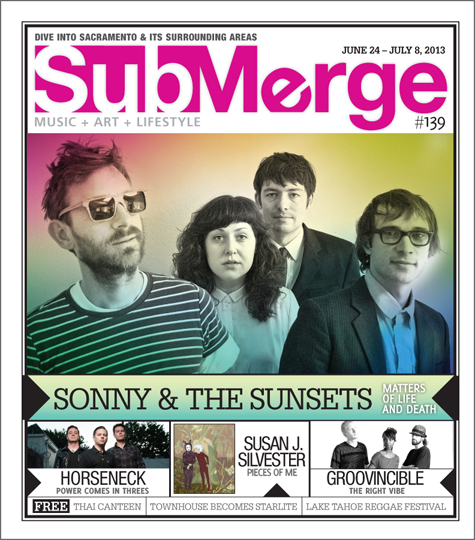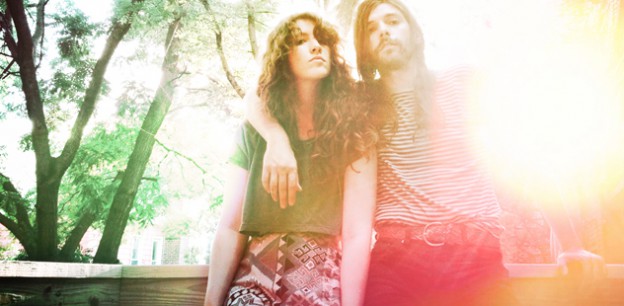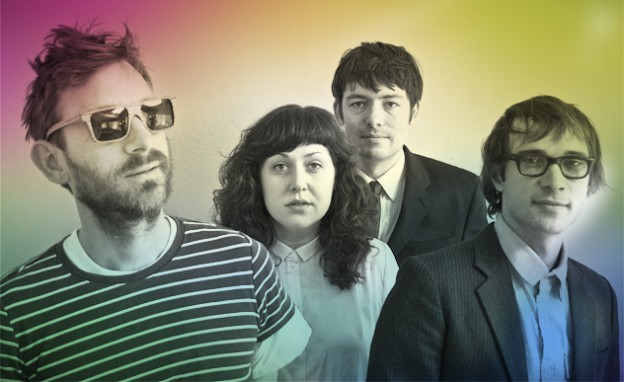If it were 1921 and you heard at random that Molly Hamilton and Robert Earl Thomas were coming to town, you might lock your doors in fear of being mowed down by a Tommy gun at the hands of two savage and depraved, gin-crazed hoods. But of course it’s not 1921, it’s 2013! And Molly Hamilton and Robert Earl Thomas would be none other than Widowspeak, the Brooklyn, N.Y.-based, self-ascribed purveyors of “cowboy grunge” and “heartland rock.” Their forthcoming EP, The Swamps, continues along the path paved by Almanac, which, released on Captured Tracks in January 2013, was Widowspeak’s first output as a two-piece. For their latest, Hamilton’s airy vocal delivery (reminiscent of and oft-compared to Hope Sandoval) is appropriately pervasive throughout The Swamps, which floats ethereally through oaks and bogs of a Southern landscape they’ve driven countless times on tour. And Thomas—not to be construed as second fiddle, by any means—deftly applies an understated Western handle to the song craft, carving a distinctive niche for Widowspeak’s music and allowing them to subtly separate from the more obvious comparisons to Cults and the aforementioned Mazzy Star.
And life as a tandem is good. Time in the van of late has been spent listening to Tropicalia compilations of the ‘60s and ‘70s, Os Mutantes and the likes of Nancy Sinatra and Lee Hazlewood. Having just played Austin City Limits the week before, Hamilton and Thomas are currently taking a little break in Texas’ fabulous lone freak harbor, Austin. Hamilton, in fact, was awaiting a guest bartender shift at Mohawk’s later that night (“I’ve only bartended twice in my life, and I was really terrible both times”) when she took a little time to catch up with Submerge.
So The Swamps EP is your second release in less than a year—you’ve been real busy, I have to assume.
We did a three-month-long tour starting with South By [Southwest], and were gone until midway through June and then did another three-week support tour; the EP kind of just happened ‘cause we were cooped up in the car all the time. I was doing a lot of writing trying to think of what our next record was going to sound like. And even though we haven’t made headway on that record, we realized we had these songs that weren’t necessarily made for the LP but were their own cohesive idea… A lot of them were about driving through the South, but honestly I was motivated a little bit about not wanting to live in New York anymore.
You grew up in Tacoma, Wash. right? Do you miss the wide open spaces of the West Coast after having lived in New York for a while?
I definitely miss seeing any semblance of natural environment. There are amazing things about New York, but I think what draws me to a place is looking out the window and seeing a tree, or a cactus, or a mountain. I’ve lived there for seven years, and it’s not like I’m turning my back on it, but I’m keeping my ears open for wherever…[maybe] someplace you can actually afford to be a creative person.
Prior to Almanac, Michael Stasiak—who was a founding member—had left the band, which ultimately made Almanac something of a reinvention of the group.
Basically our entire songwriting process changed.
I would imagine there must have been some general strife in losing your band mate, so was there greater ease in the whole process of putting Swamps together since it’s been just you and Robert for some time?
Definitely. With Almanac it’s not that we were rushed or were even rushing ourselves; it was kind of wanting to prove that we could do it. We wanted to make a record. So when Michael amicably decided he didn’t want to be in the band anymore, we were like, “Well we’re gonna do it! It doesn’t matter!” And with The Swamps, we’d been touring a lot and had fallen into a good routine, writing in hotel rooms, working really well together. When I first met Rob we had to write together, and the band was fun, but we didn’t really expect anything out of it. I didn’t expect to have this rapport in writing with him that I do now.
I read an interview where you embraced the exposure you’ve received from having “Harsh Realm” featured in American Horror Story, which I think is the right way to feel about it. Do you find it interesting how the furthering of technology and the scope of online media and so forth has made the concept of “selling out” kind of antiquated?
I think there’s always tasteful ways to go about doing it, and then there’s ways that you can just feel in the pit of your stomach are not a good representation of you or your band. The thing with synching is that we didn’t realize how much money was in that sort of thing. We didn’t even realize we’d get paid for it—and we haven’t gotten much—but so many people are watching and so many people are getting exposed to the soundtracks… I’ve seen so many bands get the attention they deserve because of random spots. Shows aren’t the evil behemoth people think they can be, and I don’t think commercials are by default, [either].
I think mainstream media these days has the capacity to be a lot more hip than when we were kids. I’m 30, and I don’t remember hearing anything cool in commercials or on network television when I was younger.
A lot of musicians I’ve respected have done commercials. I heard a Joanna Newsome song in an HSBC ad. Kurt Vile is in a couple commercials. In an interview he said something like, “Hey, I have a family.” And it’s true. It’s a job, and I don’t know if it’s fair for anybody who’s not in that position to say you have to stick to some sort of antiquated idea of “musicians don’t do this.”
I’m curious: Does the lameness of Matchbox 20’s Rob Thomas have anything to do with Rob going by Robert Earl Thomas?
[Laughs] Kind of a little bit. On the one hand, he’s actually Robert Earl Thomas III, and his dad goes by Rob. But also, he makes a ton of jokes whenever Matchbox 20 gets on the radio. Like, “Hey guys, this is me! I’m killin’ it!” And anytime it’s 3 a.m. he’ll bust into song.
Now permit me to ask a personal question I don’t know the answer to… Are you and Rob a couple?
[Pauses, laughs.] It’s funny, we’ve actually never been asked that in an interview. Yes. We’ve actually never told any media, and it doesn’t matter if it’s out there. It’s funny because we were always wondering when somebody would ask us. But it’s a relatively new development; we weren’t when we started. I think through the process of recording the last [couple] records, we just kinda started seeing each other. I don’t know if it’s like chicken-or-the-egg of being so intertwined creatively, but I feel like we probably could’ve continued making records if we weren’t [involved]; but I can’t even imagine it because so much time has been spent in this band that it’s kind of become my life.
Riddick
Rated R
Here’s a few things I bet you didn’t know:
1) Vin Diesel is 46 years old.
2) When I was 17, I took a girl named Jordan to see Pitch Black, the first film in the Riddick franchise.
3) She wanted to see The Beach, starring Leonardo DiCaprio.
4) We didn’t get married.
That was 14 calendars ago. And you know what? Leo is still boyish and Vin Diesel is still bald. Also, Vin Diesel still makes movies about Richard B. Riddick, an escaped convict of the distant future with burnt pupils and night vision who constantly finds himself marooned on destitute and dangerous planets at the far reaches of the galaxy. Which leads us to the third (and hopefully final) installment to the Riddick lexicon, Riddick. (Yes, they took a cue from Rambo with the eponymous sequel title, only they upped the ante and did it for part three as opposed to four.)
OK, alright, let’s get serious. You might be asking of me, “Why review a movie you obviously couldn’t like?” Well, because that’s not the case. I like Pitch Black. Quite a bit, actually. It’s a quirky, dark, sci-fi-action flick with more than enough panache to satisfy fans of the genre. And while I skipped The Chronicles of Riddick in 2004, I figured Riddick would hold up well enough.
But I figured wrong.
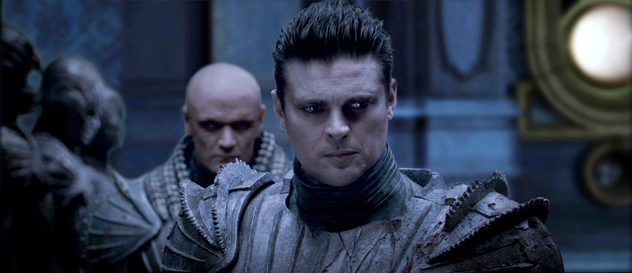
The story goes as follows: Having successfully bested the Necromongers on the planet Helion to become Lord Marshall of the Necro throne, Riddick is betrayed by the very Necromongers he conquered, leaving him once again left for dead on a little-known, weather-beaten planet out in the great beyond. Battered and bruised, surrounded by myriad hyena-like jumbo dogs and scorpion-tailed bog creatures, Riddick rises from the ashes, fighting his way to a livable existence. And that’s the first half-hour of the movie; Riddick fighting wild dogs and swamp things, I shit you not. Then, after nabbing a wild pup to raise as his own, Riddick and his scorched-earth hound take to the planetary wasteland. They come across a seemingly abandoned mercenary outpost only to be surprised from above by—you guessed it—mercenaries, hot on Riddick’s villainous trail.
I think it’s worth mentioning here that I have no problem with Vin Diesel as an actor or an action hero. Sure, he’s one-dimensional, but it’s a pretty good dimension. He’s got the deep voice, the rugged physique and those intimidating, bald-headed good looks. I’d even go as far to say that he’s a fairly decent actor, given the field. But upon the arrival of the first band of mercenaries, it’s blatantly obvious that all the Diesel-y machismo in this world or any other can’t save Riddick from a script worthy of the fireplace and a supporting cast begging for SAG card revocations. The head “merc” is Santana (Jordi Mollà), an evil rapist/killer. Only trouble is that Mollà, who was pretty damn good in Blow a decade ago, stinks as the bad boy, and is something akin to a very poor man’s Peter Stormare with a Central American accent.
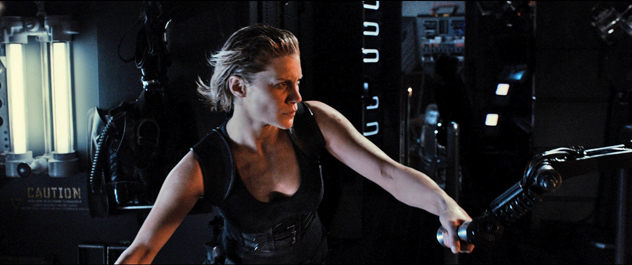
Anyway, Santana and his henchman claim they’re going to put Riddick’s “head in a box,” and are just about to set out doing so when a second band of mercs arrive on the scene. This motley but professional-looking crew is led by Boss Johns (Matt Nable), the father of some other merc Riddick supposedly killed on some other planet. Johns is side-kicked by Dahl (Katee Sackhoff), a beautiful, broad-shouldered, big-breasted blonde that kicks ass, takes names, (insert cliché here) and doesn’t “fuck guys.”
The plot from this point forward is completely irrelevant and consists mainly of mercs trying to kill Riddick, Riddick in turn killing mercs, and whatever and what have you and so on and so forth. At some interval Santana kills Riddick’s dog, which prompts Riddick to later return the favor by kicking a machete, while chained, into Santana’s face, cutting his head in half and into the very box meant for Riddick’s. So I guess that was pretty cool. And while I don’t want to let the cat out of the bag, let’s just say the bog scorpions play a key role in the film’s titillating finale. Oh, and toward the end Riddick comments on the color of Dahl’s nipples and says he’s gonna go “balls deep.”
So you might say Riddick is Vin Diesel’s greatest role since Saving Private Ryan. But I don’t care what anybody says: He’ll always be Private Caparzo to me.
Sonny and the Sunsets to appear at Second Saturday Art Walk
Sonny Smith speeds toward Youngstown, Ohio, for a Monday night stopover with enough songs in his pocket to make The Ultimate Fake Book blush. He is accompanied by the Sunsets, his band and primary musical accomplice, now the co-authors of four LPs and a slew of goodies in between. Armed with an array of stand-up routines for the hi-fi (“Maria Bamford, Louis C.K., Patrice O’Neal, Hannibal Buress, David Cross—it’s almost better than music,” says Smith), the ramshackle pop outfit from San Francisco is enjoying business as usual: touring off the latest record. This time around that record would be Antenna to the Afterworld—11 songs of death, love and sci-fi that mark a return to the tumbledown rock ‘n’ roll poise Sonny and the Sunsets evinced on the likes of Tomorrow Is Alright and Hit After Hit. Submerge caught up with Smith for a bit of the old how’s-your-father in anticipation of their stop at Second Saturday’s THIS festival on July 13, 2013.
I read an interview you recently conducted with San Francisco psychic Jessica Lanyadoo. You spoke at length about her thoughts on death and the afterlife, which seemed fitting given much of the content on Antenna to the Afterworld.
I’ve always been interested in death, to be honest. My songs aren’t macabre or anything, but there are a lot of lyrics, in the past records too, that are about death. I’ve had a couple people die [in my life], and it wasn’t something that made me sad or depressed; it was something that made me curious.
A morbid curiosity?
I guess literally speaking it’s morbid curiosity. But not only the afterlife or the afterworld, but all those things we’ve thought about as humans but really don’t [understand]—dimensions, other universes, alien life; all that shit. And as far as my beliefs, I kind of believe in everything. Although I wouldn’t bat an eye if none of that existed either.
So is this psychic a close friend or just somebody you happened to chitchat with?
I was bought a present from my band to visit her. I had no idea she’s also a medium. So within the session she said that I had a visitor and would I like to talk to this visitor. She described this visitor, and it pretty much fit this woman I knew who had died—an older woman that I wasn’t incredibly tight with, but knew her as a fan.
The psychic said she had some things to impart…something along the lines of “don’t wallow in loneliness; live, because I didn’t.” She’d had a son that committed suicide at a young age, and she was very depressed for a couple years and then died in her sleep. If you’re a romantic, you might think she died of a broken heart. Now, I have no idea if that stuff is actually happening, and if a medium is actually contacting the dead. I don’t profess to know anything, but I left the meeting just being inspired to think about the afterlife and afterworld.
Can’t hurt for songwriting content.
It was just really impactful. It’s not like you walk home and go, “I’m gonna write a bunch of songs about this.” You’re just kind of excited and interested in something and then naturally six months later you realize it’s worked its way into what you’re working on. My fascination with the afterlife was just a natural tie-in to my fascination with sci-fi… It just all kind of fit and became this record. Even the title, I didn’t make that up. A friend of mine was laying down a guitar track and he wasn’t happy with it. He said something like, “I need another beer or two for my antennas to go into the afterworld.” And I [said], “Man that is so beautiful. Can I use that?”
One song on the new record that grabbed me lyrically is “Natural Acts,” in which you profess “I was a freak, I was a dog” in the “graveyard of my youth.” Who were you as a kid?
I don’t know who I was. I think there’s a part of me that feels like I was and always have been a bit of a misfit. I would stop short of saying outcast, but I was one of those kids that always had that feeling, you know? In high school I was one of those stoners who kind of hung on the fringe with two or three people and didn’t mix. And before that there was some sense that I wasn’t a joiner, even though I was on soccer teams and stuff. Growing up and being an artist, sometimes I’ve kind of felt within a room but alone. A lot of songs are about being a dog, or being from another planet, or being a freak.
What were you listening to back then?
Well that part of being a kid was incredible. I had these extreme phases that would last maybe eight months. If it was fourth or fifth grade me and my buddies all chose our own band. Matt Penwell had Ratt, and Shawn McGuire had Mötley Crüe, and I had Iron Maiden or something like that. We’d be so into it we’d write “Ozzy” on our fingers. And then a year later I’d be into Thompson Twins and all that new wave stuff; we had a very distinct year of Howard Jones and General Public and Frankie Goes to Hollywood. And then a year later that was over and I was on a breakdance team and had a breakdance name. We were listening to Nucleus and Daft Punk and Herbie Hancock’s “Rockit.” I was one of those kids that was moving through these identity phases all the time. I don’t do that anymore [with] my identity, but artistically it’s why I like to move through phases.
Longtime Companion, if you’re talking about phases for the Sunsets, is a good example. You were into country at the time. You did it, and now you’ve moved onto something else.
Exactly. I want to have a band where people are like, “Yeah, did you ever hear that third record they did, that country record? That’s a trip.”
How do you feel about the scene in San Francisco and how it compares to other spots around the country?
Um, overrated? I know there are a lot of creative people in San Francisco, but I don’t always know why one city gets shined a light on and others don’t. There’s been times when Austin is thought of to be this haven for this, or Detroit is this place for that, but I went to Melbourne and I saw all these bands that were slaying just as much as when I play in San Francisco, if not more. Or I end up on a bill randomly with some band from Cleveland and they’re incredible. San Francisco gets a lot of attention, but most of the bands in San Francisco live in Oakland. San Francisco is such a city of affluence and influence that it’s kind of just sucking up the people around it. There’s certainly great artists and bands in San Francisco because people go there and it’s kind of a snowball effect just like New York; but there are great artists in so many places, I always feel weird thinking that San Francisco deserves some sort of extra credit.
Sonny and the Sunsets will perform on Saturday, July 13, 2013 at THIS, a new Second Saturday summer series block party that goes down on 20th street between J and K Streets (outside the MARRS Building). The event is free, runs from 4 to 9 p.m. and all ages are welcome. Opening on July 13 will be Kisses, Extra Classic, Brown Shoe and DJ Roger Carpio.
